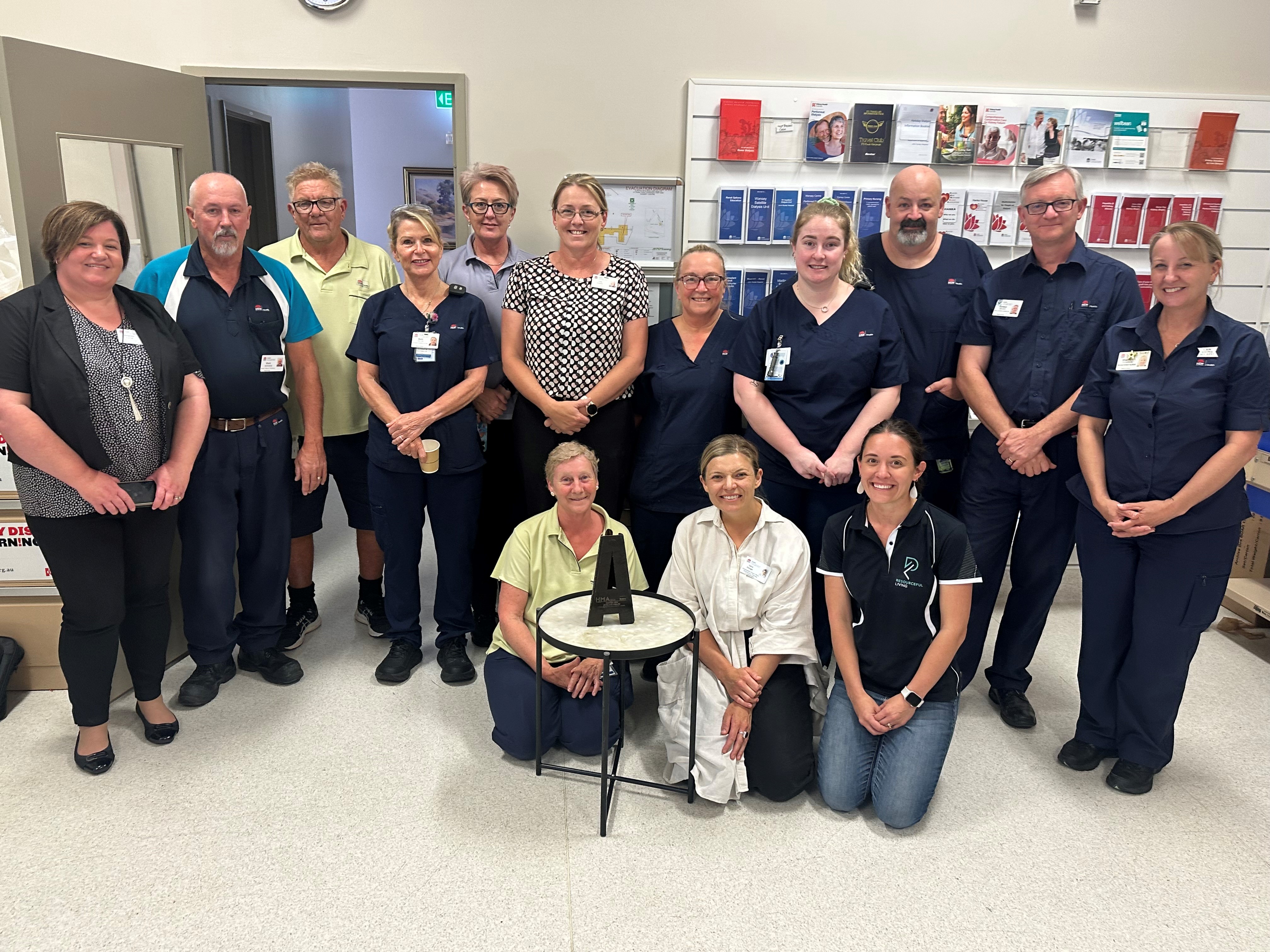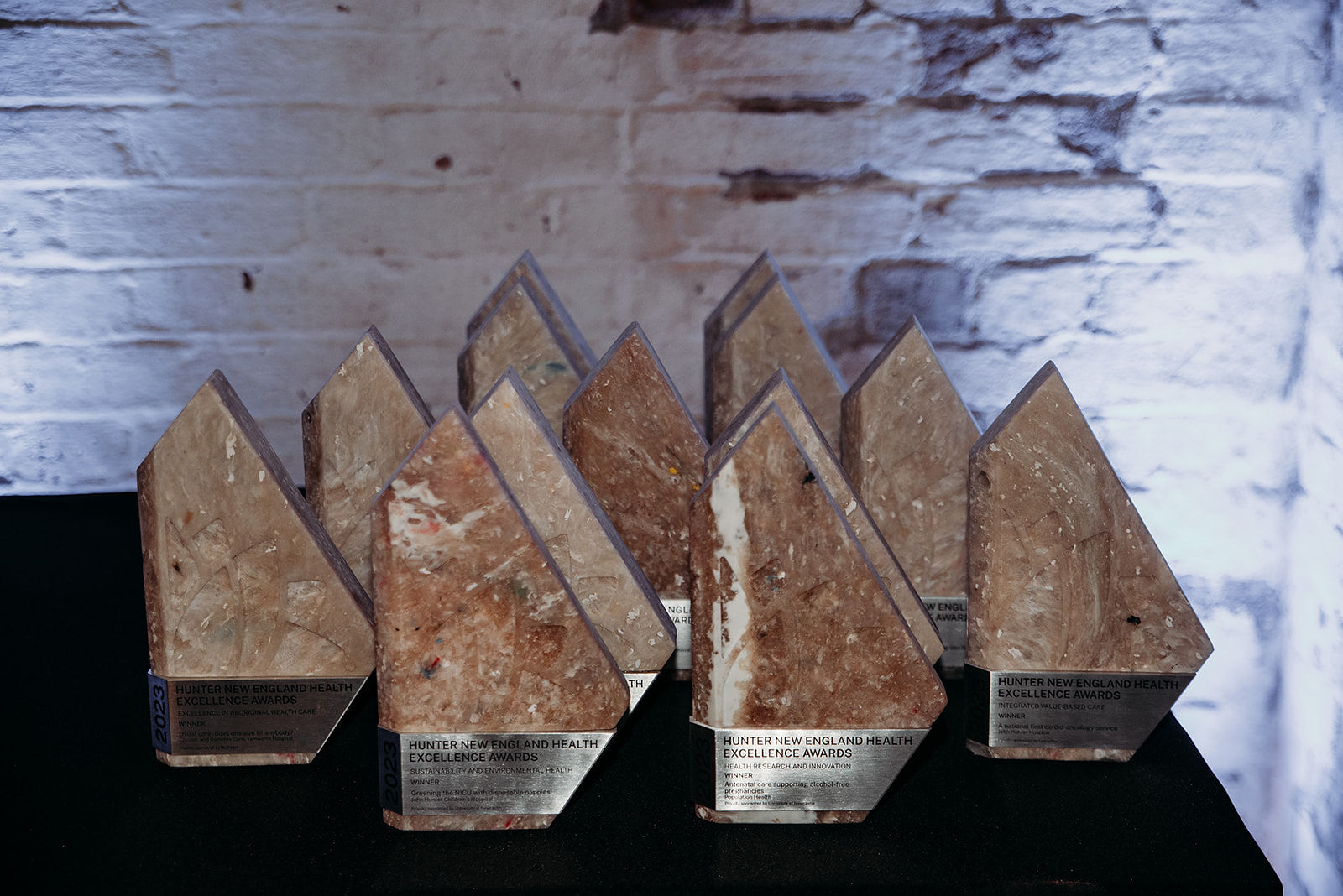Recycling Renal Dialysis Plastics
Our renal dialysis units have been exploring recycling opportunities to manage unavoidable single use plastic products that are not accepted by mainstream recycling facilities and would be otherwise be destined for landfill. Manufacturing the 2023 Hunter New England Local Health District Excellence Awards out of plastic waste generated from our renal dialysis units is symbolic of our ambitious Sustainability Strategy and shows us what is possible for the future.
Check out the promotional video that was launched at the Hunter New England Local Health District Excellence Awards in August 2023:
Kidney Disease and Climate Change have a bi-directional relationship1. The absolute rise in global temperature and the frequency of extreme heat events is increasing the burden of kidney disease across the world2. Haemodialysis is a resource intensive process with high energy and water demands as well as high volumes of single use plastic waste.
Key Figures:
- HNELHD provides approximately 41,000 haemodialysis treatments each year.
- A North American study3 estimated the carbon footprint of a single haemodialysis treatment to be 58.9kg CO2 eq3. Based on the available data, haemodialysis services provided by HNELHD have a carbon footprint of 2424.9 tonne per annum. This is equal to driving 9,758,000km in a standard car!
- Waste audits conducted by the HNELHD project team estimated that 0.6kg of uncontaminated plastic waste is generated per haemodialysis treatment. Based on the audit data, it can be surmised that the haemodialysis services provided by HNELHD generate an average of 25 tonne of recyclable plastic per annum.
Most of the uncontaminated plastic waste generated by a haemodialysis treatment has been identified as polypropylene. The plastic waste generated by a haemodialysis treatment is not accepted in mainstream recycling facilities for a range of reasons however HNELHD partnered with a local plastic recycler, Resourceful Living, to explore opportunities to divert these items from landfill and give them new life.
To showcase the project and champion sustainability across a range of organisations in the local community, HNELHD partnered with Resourceful Living, Muswellbrook Shire Council and The Melt to design and manufacture the 2023 Hunter New England Local Health District Excellence Awards out of plastic waste generated from our renal dialysis units.
REFERENCES
- Stigant, C., Barraclough, K., Harber, M., Kanagasundaram, N., Malik, C., Jha, V., & Vanholder, R. (2023). Our shared responsibility: the urgent necessity of global environmentally sustainable kidney care. Kidney International, 104(1), 12-15. https://doi.org/10.1016/j.kint.2022.12.015
- Johnson, R., Sanchez-Lozada, L., Newman, L., Lanaspa, M., Diaz, H., Lemery, J., Rodriguez-Iturbe, B., Tolan, D., Butler-Dawson, J., Sato, Y., Garcia, G., Hernando, A., & Roncal-Jimenez, C. (2019). Climate Change and the Kidney. Annals of Nutrition and Metabolism, 74(3), 38-44. https://doi.org/10.1159/000500344
- Sehgal, A., Slutzman, J., & Huml, A. (2022). Sources of Variation in the Carbon Footprint of Haemodialysis Treatment. Journal of the American Society of Nephrology, 33(9), 1790-1795. https://doi.org/10.1681/asn.2022010086
Throughout 2023, Resourceful Living was able to repurpose 415kg of single use plastic that would otherwise have been destined for landfill. This has saved 2230kg of CO2 emissions which is equal to driving 13360km in a standard car. As well as manufacturing the Hunter New England Local Health District Excellence Awards, Resourceful Living have created tabletops, plant pots, home decor and jewellery from hospital plastic.
This work was recognised at the 2023 Hunter Manufacturing Awards where Hunter New England Local Health District and Resourceful Living won the 2023 Collaboration Partnership Award.
Pictured below is the dedicated team at Wansey Dialysis Unit in Charlestown being presented with their new recycled plastic coffee table from Jess at Resourceful Living!

To further mitigate plastic waste and embed widespread recycling of unavoidable single use plastic items, HNELHD are working directly with suppliers to ensure that we are procuring well designed products that facilitate resource recovery and promote a circular economy.
If you have any questions relating to the Recycling Renal Dialysis Plastics Project please contact:
HNELHD Sustainability Project Officer: Alana Stoeger at Alana.Stoeger@health.nsw.gov.au
If you have any questions relating to the HNELHD Sustainability Strategy or other Sustainability Projects please don’t hesitate to contact:
HNELHD Sustainability Project Team at HNELHD-SustainableHealthcare2030@health.nsw.gov.au

